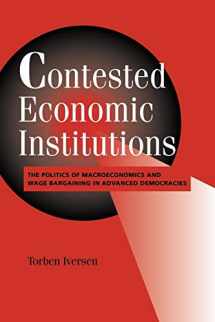
Contested Economic Institutions: The Politics of Macroeconomics and Wage Bargaining in Advanced Democracies (Cambridge Studies in Comparative Politics)
Book details
Summary
Description
This book helps explain one of the most intriguing and politically salient puzzles in comparative political economy: why some countries have much higher unemployment rates than others. Contrary to new classical economics the focus is on explaining distribution and equilibrium unemployment, and contrary to neo-corporatist theory the role of monetary policy and rational expectation is integral to the analysis. The book makes two central arguments. The first is that monetary policies affect equilibrium employment whenever wages are set above the firm level. The second argument focuses on the distributive effects of different institutions, and models institutional design as a strategic game between partisan governments and cross-class alliances of unions and employers.


We would LOVE it if you could help us and other readers by reviewing the book
Book review



